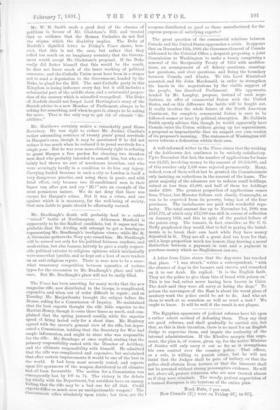Mr. W. H. Smith made a good deal of the
absence of petitions in favour of Mr. Gladstone's Bill, and- treated that as evidence that the Roman Catholics do not feel the stigma which the disability implies. The Duke of Norfolk's dignified letter to Friday's Times shows, how- ,ever, that this is not the case, but rather that they welled too much on an imaginary certainty that the Govern- ment would accept Mr. Gladstone's proposal. If the Duke really did flatter himself that this would be the result, le does not know much of the inner working of political caucuses ; and the Catholic Union must have been in a stupor not to send a deputation to the Government, headed by the Duke, to plead for the Bill. The anti-Catholic party in this Kingdom is losing influence every day, but it still includes a substantial part of the middle class, and a substantial propor- tion of the oratory which is miscalled evangelical. The Duke -of Norfolk should not forget Lord Hartington's story of the Scotch advice to a new Member of Parliament, always to be -asking for something, and when he gets it, always to be asking -for more. That is the only way to get rid of chronic. " dis- :abilities."










































 Previous page
Previous page